Search
Remove Ads
Advertisement
Search Results
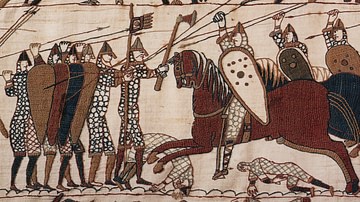
Image
Battle of Hastings, Bayeux Tapestry
A scene from the 11th century CE Bayeux Tapestry showing Norman cavalry charging Anglo-Saxon infantry at the Battle of Hastings in 1066 CE. (Centre Guillaume le Conquérant, Bayeux, France)

Image
Norman Cavalry at Hastings, Bayeux Tapestry
A scene from the 11th century CE Bayeux Tapestry showing the Battle of Hastings in 1066 CE. (Centre Guillaume le Conquérant, Bayeux, France)
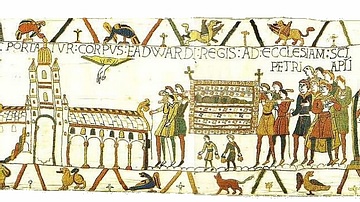
Image
Funeral of Edward the Confessor, Bayeux Tapestry
A depiction on the Bayeux Tapestry (1067-1079 CE) of the funeral of Edward the Confessor, king of England from 1042 to 1066 CE. The building is Westminster Abbey, which Edward founded. (Centre Guillaume le Conquérant, Bayeux, France)
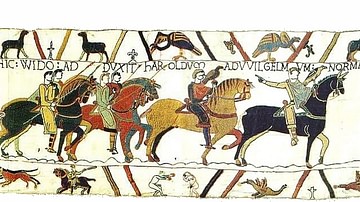
Image
Harold Godwinson, Bayeux Tapestry
A depiction of Harold Godwinson (Harold II), king of England (r. 1064-1066 CE) hawking. From the Bayeux Tapestry, 1067-1079 CE. (Centre Guillaume le Conquérant, Bayeux, France)
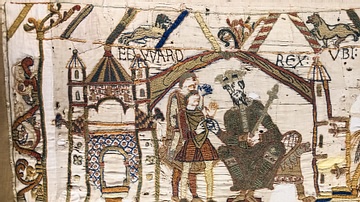
Image
Edward the Confessor, Bayeux Tapestry
Edward the Confessor (r. 1042-1066 CE) with Harold Godwinson (left), from the Bayeux Tapestry (1067-1079 CE). (Centre Guillaume le Conquérant, Bayeux, France)
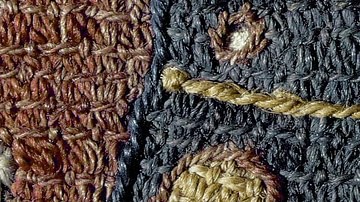
Image
Stitching in the Bayeux Tapestry
Shown here is a detail from the Bayeux Tapestry. Though referred to as a tapestry, it is a linen cloth that features embroidery in eight different-colored wools. 11th century CE.
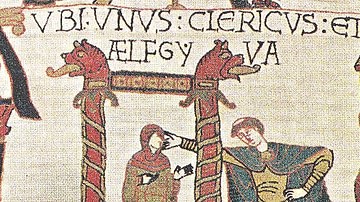
Image
Aelfgifu Scene, Bayeux Tapestry
A woman named Aelfgifu with a clergyman, depicted on the Bayeux Tapestry, made c. 1067-1079. The identity of Aelfgifu is unclear, and the name was common among Old English royal women. Two leading candidates for being the Aelfgifu in this...

Video
Why did Victorians Censor the Bayeux Tapestry?
Why did the Victorians put pants on the Bayeux Tapestry?
This video was inspired by the BBC series Civilisations.
Video Journalist: Adam Paylor
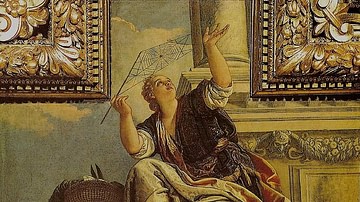
Definition
Arachne
Arachne, from the Greek arákhnē (meaning spider), is a figure in Greek mythology whose talent for weaving was renowned and who famously challenged the goddess Minerva to a weaving competition. As told in Ovid’s (43 BCE-17 CE) Metamorphoses...

Video
Masterpiece: Standing Brahma and Standing Indra
Brahma and Indra, or Bonten and Taishakuten as they are known in Japanese, were Hindu deities brought into Buddhism as attendants of the Buddha or of bodhisattvas. The Asian Art Museum's Bonten and Taishakuten are the only large-scale, matched...